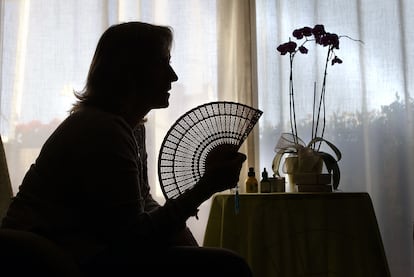Women spend a third of their lives in menopause: Why it is important for them to take care of their mental health
One in three will experience significant psychological changes during perimenopause

October 18 is World Menopause Day. Menopause remains a taboo subject. It is a mysterious topic for the entire population, but particularly for those who it affects: women. We arrive at this vital stage without information that allows us to understand what is happening to our body, mind and mental state. Days like World Menopause Day are important because they help give menopause greater visibility not only among women, but also for men, health professionals and the media.
Promoted by the International Menopause Society and the World Health Organization, this year’s theme is dedicated to mental health, as one in three women will experience significant psychological changes during perimenopause.
We need to understand several terms and concepts in order to have a more holistic vision of what happens in this stage of life. Let’s review them.
The climacteric stage is the phase that marks women’s transition from the reproductive to the non-reproductive phase. In general, this does not happen overnight. Rather, over the years, the ovaries reduce the production of hormones and ovules until the ovarian reserve is depleted, that is, eggs are no longer formed and menopause begins.
The concept of perimenopause is often used as a synonym for the climacteric phase, since it encompasses the years in which endocrine, clinical and biological changes begin to the first year after menopause. Whether we speak of the climacteric phase or perimenopause, this period includes transition menopause, which refers to the last years immediately after menopause, in which the woman experiences important alterations in her menstrual cycle.
Menopause is defined as the permanent cessation of menstruation as a result of the loss of ovarian follicular activity. Natural menopause is confirmed after 12 consecutive months without menstruation. No biological marker tells us when the last period has occurred, so we will have to wait for the full year to pass to confirm the date. That is why it is so important that we continue to keep track of our periods, even if they appear every few months. Once menopause has occurred, a woman enters postmenopause.
There are cases in which menopause is not natural, but occurs as a result of a surgical procedure in which both ovaries are removed (regardless of whether the uterus is also removed or not) or due to the effects of treatments such as chemotherapy or radiation therapy. That induces what is known as induced menopause, which can have the same symptoms as natural menopause.
Some women experience premature menopause, where menstruation stops naturally before the age of 40. The causes are not known, but it is important for these women to know that the risk of cardiovascular disease, osteoporosis or cancer increases compared to women who go through menopause at the conventional age. It is essential for them to take measures to take care of themselves in consultation with a health professional.
Menopause plays a significant role in women’s lives today. In the year 1900, the average age of menopause was 51 years and the average age of death in women was 59. Those women spent about eight years without menstruation until they died. Currently, the average age of menopause remains the same, 51 years, but the average age of death in women is 83 years. This means that a woman spends about a third of her life in menopause. It is too serious to ignore.
Many of the symptoms caused by a lack of estrogen can be confused with other pathologies, from depression and anxiety, to fibromyalgia, severe migraines or memory problems. It is essential that the health professionals delve into their female patients’ medical and personal history. Due to ignorance, shame or normalization, the patient may fail to mention symptoms they experience, such as hot flashes, vaginal dryness, insomnia, mood swings or low libido.
With an overburdened public health system and a lack of awareness and information about menopause in many health professionals, many women in menopause are misdiagnosed. They receive inadequate treatments that do not resolve their symptoms, often resulting in tremendous economic consequences related to sick leave, decreased productivity or early retirement.
Specifically, in the case of mental health, the guidelines are clear: there is no evidence that treatment with antidepressants improves symptoms related to psychological changes. Antidepressants should not be the first treatment option in these cases, since hormonal changes are responsible for the symptoms.
Thus, when psychological symptoms affect quality of life, hormone therapy for menopause should be considered as the first option. On the other hand, it may be beneficial to seek help from a psychologist. Other recommendations include diet changes, physical exercise – combining strength training with cardiovascular and balance training –, learning to manage stress, improving rest and maintaining and strengthening social relationships. A third of our life is too long to ignore. We deserve to live it healthily and fully.
Tu suscripción se está usando en otro dispositivo
¿Quieres añadir otro usuario a tu suscripción?
Si continúas leyendo en este dispositivo, no se podrá leer en el otro.
FlechaTu suscripción se está usando en otro dispositivo y solo puedes acceder a EL PAÍS desde un dispositivo a la vez.
Si quieres compartir tu cuenta, cambia tu suscripción a la modalidad Premium, así podrás añadir otro usuario. Cada uno accederá con su propia cuenta de email, lo que os permitirá personalizar vuestra experiencia en EL PAÍS.
¿Tienes una suscripción de empresa? Accede aquí para contratar más cuentas.
En el caso de no saber quién está usando tu cuenta, te recomendamos cambiar tu contraseña aquí.
Si decides continuar compartiendo tu cuenta, este mensaje se mostrará en tu dispositivo y en el de la otra persona que está usando tu cuenta de forma indefinida, afectando a tu experiencia de lectura. Puedes consultar aquí los términos y condiciones de la suscripción digital.









































